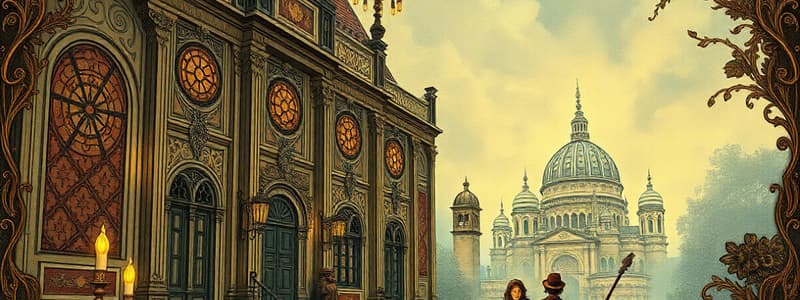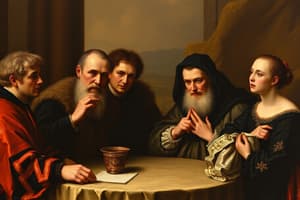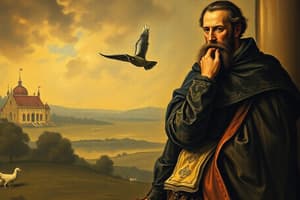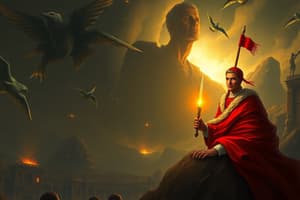Podcast
Questions and Answers
What does Machiavelli believe is the nature of man?
What does Machiavelli believe is the nature of man?
- People are inherently good.
- People are selfish and greedy. (correct)
- People are driven by noble intentions.
- People are peaceful and cooperative.
According to Hobbes, what is the primary purpose of government?
According to Hobbes, what is the primary purpose of government?
- To protect natural rights.
- To promote collective welfare.
- To provide a social contract and secure peace. (correct)
- To empower the people to make laws.
What government type does Locke advocate for?
What government type does Locke advocate for?
- Direct democracy.
- Representative democracy. (correct)
- Benevolent dictatorship.
- Absolute monarchy.
How does Rousseau view the state of nature?
How does Rousseau view the state of nature?
What type of government does Montesquieu advocate for?
What type of government does Montesquieu advocate for?
According to Machiavelli, what justifies the means used by a government?
According to Machiavelli, what justifies the means used by a government?
What does Rousseau identify as a consequence of societal development?
What does Rousseau identify as a consequence of societal development?
How do Locke and Hobbes differ in their views on the state of nature?
How do Locke and Hobbes differ in their views on the state of nature?
Which philosopher argued that people are inherently evil and that government is necessary to prevent chaos?
Which philosopher argued that people are inherently evil and that government is necessary to prevent chaos?
What did Rousseau believe about the state of nature?
What did Rousseau believe about the state of nature?
Which type of government does Machiavelli advocate as the best to maintain stability and power?
Which type of government does Machiavelli advocate as the best to maintain stability and power?
What is a common purpose of government according to both Hobbes and Locke?
What is a common purpose of government according to both Hobbes and Locke?
According to Montesquieu, which element is crucial for maintaining liberty within a government?
According to Montesquieu, which element is crucial for maintaining liberty within a government?
What did Locke believe was the primary reason for forming governments?
What did Locke believe was the primary reason for forming governments?
How did Machiavelli's view of human nature differ from that of Locke?
How did Machiavelli's view of human nature differ from that of Locke?
What is the main focus of Rousseau's philosophy on government?
What is the main focus of Rousseau's philosophy on government?
What aspect of society did Montesquieu identify as leading people to become violent?
What aspect of society did Montesquieu identify as leading people to become violent?
Which philosopher believed that the best form of government was a representative democracy?
Which philosopher believed that the best form of government was a representative democracy?
Study Notes
Machiavelli
- Advocated that human nature is inherently selfish and greedy.
- Argued that people are evil without external pressures to do good.
- Proposed that governments are necessary to protect the state, manage resources, and control citizens.
- Suggested monarchy, specifically a prince, as the ideal form of government.
- Emphasized that the principal purpose of government is to protect the nation and its assets by any means necessary.
Hobbes
- Believed that humans are naturally evil and self-serving.
- Described life in the state of nature as violent and chaotic.
- Stated that governments are essential to escape from the violent state of nature.
- Proposed absolute monarchy as the best form of government.
- Claimed that the government's role is to enforce laws, maintain peace, and establish social contracts.
Locke
- Viewed human nature as fundamentally peaceful.
- Identified the state of nature as generally peaceful, though susceptible to conflict.
- Argued that the formation of governments is to safeguard natural rights: life, liberty, and property.
- Advocated for a representative democracy as the best government.
- Defined the government's purpose as protecting individual rights and ensuring property protections.
Rousseau
- Believed that humans are naturally peaceful, with corruption stemming from society.
- Imagined the state of nature as a time of total, albeit fictional, peace.
- Asserted that governments exist to facilitate the general will for the common good.
- Idealized direct democracy as the optimal government structure.
- Highlighted the government's role in enabling citizens to create laws reflecting public interests.
Montesquieu
- Described humans as timid and fearful, with societal pressures inciting violence.
- Contended that in the state of nature, people avoided conflicts out of fear.
- Posited the necessity of governments to prevent conflicts and establish laws.
- Suggested parliamentary democracy with separation of powers as the best government form.
- Emphasized the importance of maintaining law and order, protecting individual freedoms, and upholding rights.
Machiavelli
- Believed people are inherently selfish and greedy.
- Life in the State of Nature: Humans are evil unless compelled to act benevolently.
- Governments are formed to protect the state, manage resources, and exert control over individuals.
- Advocated for monarchy, with a prince as the effective leader.
- The primary purpose of government is to protect the nation and its assets by any means necessary.
Hobbes
- View of human nature: People are fundamentally evil and driven by self-interest.
- Life in the State of Nature: Characterized by violence and chaos.
- Governments are necessary to prevent a return to this state of anarchy.
- Preferred form of government: Absolute monarchy for centralized power.
- Purpose of government includes enforcing laws, maintaining peace, and establishing social contracts.
Locke
- Argued that people have a natural tendency towards peaceful coexistence.
- Life in the State of Nature: Generally peaceful, though vulnerable to potential violence.
- Governments exist to safeguard natural rights: life, liberty, and property.
- Favored representative democracy as the best system for governance.
- The government's role is to protect individuals' natural rights and uphold property rights.
Rousseau
- Believed that man is born peaceful and that society corrupts his nature.
- Life in the State of Nature: An idealized existence of total peace (albeit never witnessed).
- Governments are necessary to allow citizens to express their general will for the greater good.
- Advocated for a direct democracy, where the people's voice directly influences laws.
- The purpose of government is to facilitate the creation of laws for the public welfare.
Montesquieu
- Described human nature as timid and fearful; society corrupts this innocence, leading to violence.
- Life in the State of Nature: Conflict avoided due to fear among individuals.
- Governments are formed to mitigate conflicts and create laws.
- Preferred a parliamentary democracy characterized by a separation of powers.
- The government's objectives include maintaining law and order, protecting liberty, and preserving individual rights.
Studying That Suits You
Use AI to generate personalized quizzes and flashcards to suit your learning preferences.
Related Documents
Description
Explore the ideas of Machiavelli and Hobbes in this quiz. Discover their views on human nature, the formation of government, and the best types of governance. Test your understanding of their philosophies and their impact on political thought.




